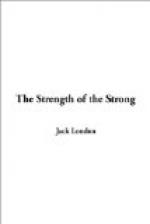At first, Freddie Drummond found it monstrously difficult to get along among the working people. He was not used to their ways, and they certainly were not used to his. They were suspicious. He had no antecedents. He could talk of no previous jobs. His hands were soft. His extraordinary politeness was ominous. His first idea of the role he would play was that of a free and independent American who chose to work with his hands and no explanations given. But it wouldn’t do, as he quickly discovered. At the beginning they accepted him, very provisionally, as a freak. A little later, as he began to know his way about better, he insensibly drifted into the role that would work—namely, he was a man who had seen better days, very much better days, but who was down on his luck, though, to be sure, only temporarily.
He learned many things, and generalized much and often erroneously, all of which can be found in the pages of The Unskilled Labourer. He saved himself, however, after the sane and conservative manner of his kind, by labelling his generalizations as “tentative.” One of his first experiences was in the great Wilmax Cannery, where he was put on piece-work making small packing cases. A box factory supplied the parts, and all Freddie Drummond had to do was to fit the parts into a form and drive in the wire nails with a light hammer.
It was not skilled labour, but it was piece-work. The ordinary labourers in the cannery got a dollar and a half per day. Freddie Drummond found the other men on the same job with him jogging along and earning a dollar and seventy-five cents a day. By the third day he was able to earn the same. But he was ambitious. He did not care to jog along and, being unusually able and fit, on the fourth day earned two dollars.
The next day, having keyed himself up to an exhausting high-tension, he earned two dollars and a half. His fellow workers favoured him with scowls and black looks, and made remarks, slangily witty and which he did not understand, about sucking up to the boss and pace-making and holding her down, when the rains set in. He was astonished at their malingering on piece-work, generalized about the inherent laziness of the unskilled labourer, and proceeded next day to hammer out three dollars’ worth of boxes.
And that night, coming out of the cannery, he was interviewed by his fellow workmen, who were very angry and incoherently slangy. He failed to comprehend the motive behind their action. The action itself was strenuous. When he refused to ease down his pace and bleated about freedom of contract, independent Americanism, and the dignity of toil, they proceeded to spoil his pace-making ability. It was a fierce battle, for Drummond was a large man and an athlete, but the crowd finally jumped on his ribs, walked on his face, and stamped on his fingers, so that it was only after lying in bed for a week that he was able to get up and look for another job. All of which is duly narrated in that first book of his, in the chapter entitled “The Tyranny of Labour.”




